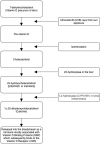Benefits of vitamin D supplementation to attenuate TBI secondary injury?
- PMID: 34992852
- PMCID: PMC8678475
- DOI: 10.1515/tnsci-2020-0195
Benefits of vitamin D supplementation to attenuate TBI secondary injury?
Abstract
Vitamin D supplementation has been shown to improve outcomes for patients suffering from a variety of illnesses such as stroke and cancer. Vitamin D deficiencies have been associated with longer hospital stays, greater severity of symptoms, and death in some complex cases. Due to vitamin D's burgeoning role in improving patient outcomes, a new sector of research is focusing on the lesser-known implications of vitamin D on health. Traumatic brain injury (TBI) affects approximately 69 million people worldwide per year. Here, we summarize the current scientific understanding of vitamin D dynamics with TBI to elucidate a potential way to lessen the cascade of secondary damage after an initial insult, with the goal of improving overall patient outcomes. Because vitamin D supplementation has been correlated with better outcomes in other pathologies involving immune and inflammatory molecules, it is important to study the potential effect of vitamin D deficiency (VDD) and supplementation on TBI outcomes. Research on vitamin D supplementation in TBI remains in the preliminary stages. There is still much to learn about vitamin D deficiency, dosage, variants of supplementary forms, mechanisms, and its role in TBI.
Keywords: calcidiol; calcitriol; concussion; traumatic brain injury; vitamin D receptor.
© 2021 Kiana Saadatmand et al., published by De Gruyter.
Conflict of interest statement
Conflict of interest: Sylvain Doré is a member of Translational Neuroscience’s Editorial Advisory Board. The other authors state no conflict of interest.
References
-
- Lee JM, Jeong SW, Kim MY, Park JB, Kim MS. The effect of vitamin D supplementation in patients with acute traumatic brain injury. World Neurosurg. 2019 Jun;126:e1421–6. - PubMed
- Lee JM, Jeong SW, Kim MY, Park JB, Kim MS. The effect of vitamin D supplementation in patients with acute traumatic brain injury. World Neurosurg. 2019 Jun;126:e1421–6. - PubMed
-
- Toman E, Bishop JRB, Davies DJ, Su Z, Criseno S, Mason A, et al. Vitamin D deficiency in traumatic brain injury and its relationship with severity of injury and quality of life: a prospective, observational study. J Neurotrauma. 2017 Apr 1;34(7):1448–56. - PubMed
- Toman E, Bishop JRB, Davies DJ, Su Z, Criseno S, Mason A. et al. Vitamin D deficiency in traumatic brain injury and its relationship with severity of injury and quality of life: a prospective, observational study. J Neurotrauma. 2017 Apr 1;34(7):1448–56. - PubMed
-
- McCann JC, Ames BN. Is there convincing biological or behavioral evidence linking vitamin D deficiency to brain dysfunction? FASEB J. 2008 Apr 1;22(4):982–1001. - PubMed
- McCann JC, Ames BN. Is there convincing biological or behavioral evidence linking vitamin D deficiency to brain dysfunction? FASEB J. 2008 Apr 1;22(4):982–1001. - PubMed
-
- Yuan J, Guo X, Liu Z, Zhao X, Feng Y, Song S, et al. Vitamin D receptor activation influences the ERK pathway and protects against neurological deficits and neuronal death. Int J Mol Med. 2018 Jan;41(1):364–72. - PMC - PubMed
- Yuan J, Guo X, Liu Z, Zhao X, Feng Y, Song S. et al. Vitamin D receptor activation influences the ERK pathway and protects against neurological deficits and neuronal death. Int J Mol Med. 2018 Jan;41(1):364–72. - PMC - PubMed
Publication types
Grants and funding
LinkOut - more resources
Full Text Sources

